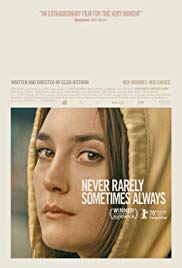
NEVER RARELY SOMETIMES ALWAYS
US, 2020, 101 minutes, Colour.
Sidney Flanigan, Talia Ryder, Theodore Pellerin, Ryan Eggold.
Directed by Eliza Hittman.
The list in the title comes from a questionnaire presented to a young client by a counsellor wanting to gauge whether the client has experienced sexual violence. It certainly draws attention to issues of sexuality, violence, relationships, emotional damage.
In many ways this is a very plain film, some commentators calling it a return to neo-realism. It does not draw attention to itself in flashy style, rather presenting the characters, their situations, their dilemmas, their challenges, decisions and action.
We are introduced to Autumn, a 17-year-old from Pennsylvania, participating in a talent show. She is not particularly good and there are some hackles from the audience, applause from her family. At the celebration afterwards, she is very moody. The young man at another table taunts her with some lewd gestures. She throws a glass of water over him. So, this is Autumn.
Autumn works as a checkout assisted in the supermarket, along with her cousin, Skylar. At home, Autumn gets on well with the rest of the family as can be except for the taunts from her father. Skylar notices something wrong – and the theme of the film emerges. Autumn is pregnant.
Which leads the film into considerations of abortion, Autumn going to local help centres, having a pregnancy test, ask questions for and against abortion. She decides her, however, to go to New York City to a more professional centre and is accompanied by Skylar who has taken a wad of money from the supermarket takings she was handing in.
The film is very matter-of-fact in its presentation of the situation, not taking any particular moral stances, perhaps a reflection of the secular society in which the Western world lives. Autumn is treated well by the women who interview her, counsel her, explain the procedures, offer the chance to her to withdraw from the process.
The process actually requires the couple to stay overnight in New York City and they try to find ways of surviving of getting some money.
Nor does the film dramatises the abortion experience in any sensational way. Whether people approve or not, this is a process, this is the experience, these are the consequences, these are the effects. Which means that the film, which supports abortion, can be viewed by audiences who approve of or disapprove of abortion, an opportunity to look at the human experience side as well as the moral principle side.
1. The title? The questionnaire for the client? The tone?
2. Pennsylvania background, homes, clubs, clinical centres? The transition to New York City? The streets, accommodation, the clinics, the abortion centres? The musical score?
3. Introducing Autumn, the various items at the talent show, her singing, mournful, the power of love, domination? The heckler in the audience? Her family applauding her? The aftermath, her mood, the criticism by her father, her mother praising her, the other members of the family? The young man and his suggestive attitude towards her? Her throwing the water over him?
4. Autumn as a person, age 17, at school, minimal ambitions, working at the checkout? Her friendship with Skyler, her cousin, Skyler as concerned, noticing Autumn’s attention? The work in the supermarket, the request to leave early, refused? Skylar being sick?
5. Autumn, awareness of the pregnancy, her going to the centre, the welcome, the discussions, protesters against abortion, documentary film? The test, the same as from the supermarket? Its being positive?
6. The issue of the abortion, Skylar taking the money at the supermarket, giving it to Autumn? Their going to New York, the train?
7. Autumn, moods, uncertain, straightforward in her decisions? Going to the New York clinic, the warm reception, the various guides, interviews, testing about her decision, testing about any violence towards her? The film’s title and the questionnaire? Her definite answers – although the hesitation about some sexual violence towards her?
8. The two-day procedure, Autumn agreeing, the need to stay overnight, Skylar and her continued support? The flirtation? Getting the money?
9. The return, the nursing staff, the procedure, all presented ordinarily?
10. The aftermath, feeling uncomfortable, yet well, Skylar and her support? The decision to go home?
11. The realism of the characters, the situations? The issue of abortion, for and against? In a secular society and context?